Digital Poster
Hyperpolarization (Non-Gas): New Developments
ISMRM & ISMRT Annual Meeting & Exhibition • 10-15 May 2025 • Honolulu, Hawai'i

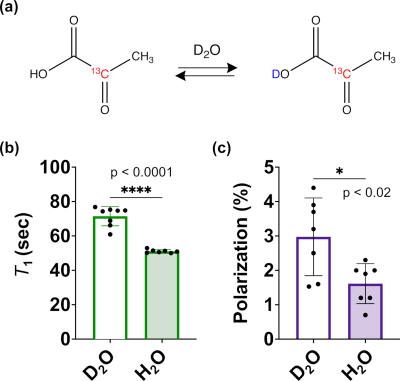 |
Computer Number: 49
4475. D2O
vs H2O Dissolutions for Enhancing Human MR Imaging of
Hyperpolarized [2-13C]Pyruvate Conversions to Glutamate and
Lactate
Y. Kim, I. Shkliar, D. Dang, T. Nickles, E. Escobar, S.
Andosca, R. Bok, J. Gordon, D. Vigneron
University of California, San Francisco, San Francisco, United States
Impact: Dissolving hyperpolarized [2-13C]pyruvate
in D2O
instead of H2O
increased T1,
yielding higher polarization for human MRI studies. This
approach is expected to improve the quality of
hyperpolarized [2-13C]pyruvate
MRI, enabling more accurate assessments of oxidative &
glycolytic metabolism of pyruvate.
|
|
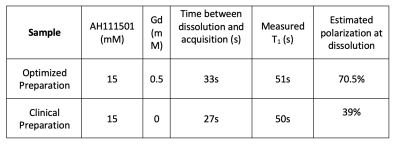 |
Computer Number: 50
4476. Optimization
of a [1-13C]pyruvic acid sample preparation for clinical
hyperpolarization
J-N Hyacinthe, K. Yeung, T. Lê, D. Tyler, J. Grist, A.
Capozzi
EPFL, Lausanne, Switzerland
Impact: Hyperpolarized-MRI diagnostic capability depends
on the initial polarization of the contrast agent. Clinical
polarizers are complex and expensive machines. We propose an
easy to implement optimized sample preparation leading to a
50% SNR increase without any hardware modification.
|
|
 |
Computer Number: 51
4477. Design
and development of a transmit RF coil for large field of view
hyperpolarized 13C imaging
A. Chen, T. Ishiguro, F. Robb, D. Anderson, T. Thomas, J.
Vincent, V. R. Malasani, V. Taracila, T. Grafendorfer, E.
Baus, T. Stickle, A. Nozaki, J. Lau, A. Comment, C.
Cunningham, K. Keshari
GE Healthcare, Taichung , Taiwan
Impact: The 13C transmit coil developed in this project
provides uniform RF excitation across a large FOV without
compromising patient comfort and the 1H imaging. It will
be an integral element for routine clinical HP 13C metabolic
imaging in the future.
|
|
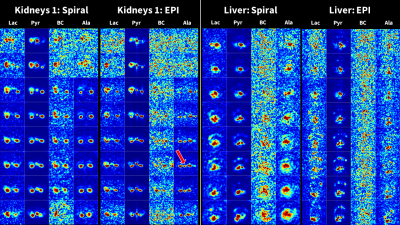 |
Computer Number: 52
4478. On
The Optimal Readout Trajectory for Hyperpolarised 13C Metabolic
Imaging
R. Schulte, E. Hansen, J. Gordon, C. Cunningham, A. Chen, P.
Larson, M. Fuetterer, A. Comment, C. Laustsen
GE HealthCare, Munich, Germany
Impact: 13C
metabolic imaging provides valuable clinical information,
such as tumour-treatment response, and may complement or
provide an alternative to PET. For clinical studies, it is
important to choose the optimal sequence.
|
|
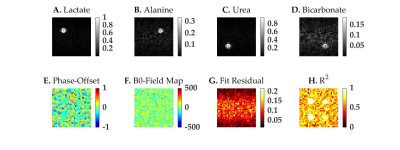 |
Computer Number: 53
4479. Advancing
13C Metabolic MRSI: Enhanced Imaging Techniques and an effective
standardized Phantom at 11.7 T
J. Schüle, T. Speidel, C. A. Müller, S. Lucas, V. Rasche
Ulm University Medical Center, Ulm, Germany
Impact: The construction of a stable and reliable
phantom with high homogeneity containing 13C-reference
solutions enables standardized sequence optimization for
hyperpolarized MRSI experiments. For preclinical in-vivo
studies, single reference solutions can further be used for
calibration measurements.
|
|
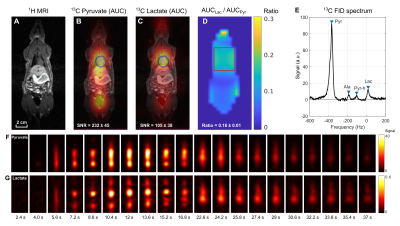 |
Computer Number: 54
4480. Fast
3D Hyperpolarized Carbon-13 Metabolic MRI with Enhanced
Spatio-Temporal Resolution Using Radial Multi-Echo bSSFP and PSF
Optimization
Z. Wang, C. Müller, J. Fischer, M. Grashei, S. Sühnel, N.
Setzer, F. Schilling, M. Awenius, A. Korzowski, A. Özen, M.
Zaitsev, M. Bock, A. Schmidt
Division of Medical Physics, Department of Radiology, University Medical Center Freiburg, Freiburg im Breisgau, Germany
Impact:
Dynamic hyperpolarized 13C MRSI imaging is optimized by a sliding-window technique, producing high-resolution dynamic images and improving kinetic model fitting. The approach optimizes trade-offs between spectral, spatial, and temporal resolution in HP 13C metabolic MRI. |
|
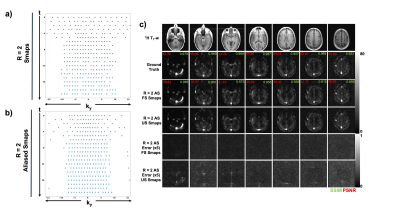 |
Computer Number: 55
4481. Joint
Optimization of Data Sampling and Reconstruction for Highly
Accelerated Cartesian 2D+time Hyperpolarized MRI with AutoSamp
T. Nickles, C. Alkan, H-Y Chen, Y. Kim, P. Larson, J. Pauly,
D. Vigneron, J. Gordon
University of California San Francisco , San Francisco, United States
Impact: Asymmetrical PF encoding of 2D dynamic HP [1-13C]pyruvate
MRI benefits from low-rank recovery reconstruction methods
to ensure image fidelity, and to increase SNR by reducing T2*
weighting.
|
|
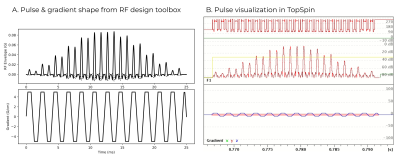 |
Computer Number: 56
4482. Modular
integration of spatial-spectral selective excitation into Bruker
Singlepulse, Flash, and EPI for metabolite selective HP 13C MRSI
C. Müller, J. Schüle, S. Hedge, A. Marshall, J. Gaubatz, L.
Nagel, P. Rütten, S. Machnes, F. Schilling, V. Rasche, I.
Schwartz
NVision Imaging Technologies GmbH, Ulm, Germany
Impact: A modular framework for spatial-spectral
excitation with Bruker product methods was implemented. The
framework can assist MRI researchers to evaluate possible RF
& gradient shapes for a specified metabolite-selective MR
exam.
|
|
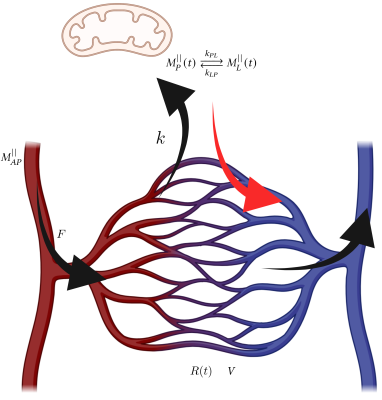 |
Computer Number: 57
4483. A
combined hemodynamic and metabolic model for in vivo
hyperpolarized 13C MRI data analysis
N. Christensen, N. Jespersen, N. Bøgh, E. Hansen, H.
Wiggers, S. Jespersen, C. Laustsen
Aarhus University, Aarhus, Denmark
Impact: Our generalized model potentially enables more
accurate quantification of metabolism in HP 13C-MRI
by accounting for perfusion and extraction effects. This
advancement may support better interpretation of metabolic
data, potentially leading to improved diagnostics and
therapeutic monitoring in clinical settings.
|
|
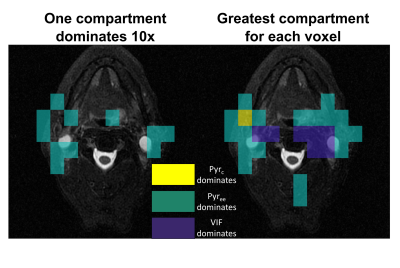 |
Computer Number: 58
4484. Kinetic
Modeling of HP [1-13C]-Pyruvate Determines Dominant
Physiological Parameters Influencing Lactate to Pyruvate AUC
Ratio
R. Boyce, C. Harlan, Q. Wang, C. Walker, S. Lai, M. Merritt,
J. Bankson
University of Texas MD Anderson Cancer Center, Houston, United States
Impact: The proposed analysis has the potential to aid
in the analysis of [1-13C]-pyruvate studies by
distinguishing between the effects of pyruvate delivery to
the cells and true Warburg metabolism in tumors.
|
|
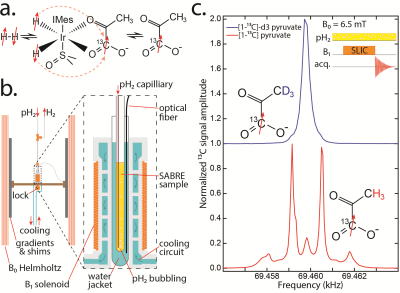 |
Computer Number: 59
4485. >106
x enhancement of 13C-enriched pyruvate via in situ
hyperpolarization in an ultra-low field MRI scanner
T. Boele, S. McBride, P. TomHon, D. Waddington, T. Theis, M.
Rosen
Image X Institute, Faculty of Medicine and Health, The University of Sydney, Sydney, Australia
Impact: These results are the first demonstration of 13C
hyperpolarization generated and measured in situ at 6.5mT
and showcase the flexibility and utility of SLIC SABRE as a
hyperpolarization method to drive widespread adoption of 13C
metabolic MRI in the clinic.
|
|
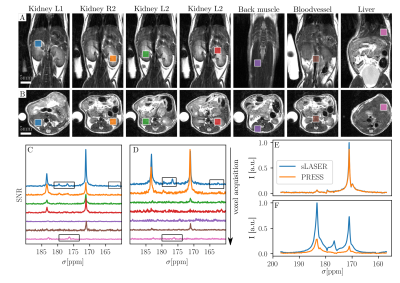 |
Computer Number: 60
4486. 3D
virtual biopsy of in vivo pH and metabolism using semi-LASER MRS
of hyperpolarized 13C nuclei
W. Gottwald, L. Nagel, M. Grashei, S. Sühnel, F. Gaksch, S.
Bauer, N. Setzer, G. Topping, F. Schilling
TUM School of Medicine and Health, Department of Nuclear Medicine, TUM University Hospital, Munich, Germany
Impact: We
show for the first time the use of adiabatic refocusing
pulses for hyperpolarized 13C
multi-voxel MRS to detect pH and metabolism, with high
spectral resolution and short acquisition time, while
maintaining high spatial customizability.
|
|
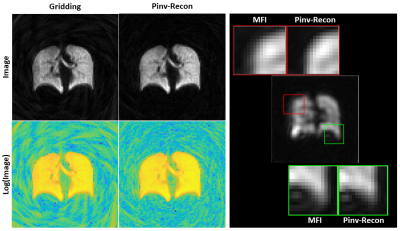 |
Computer Number: 61
4487. Novel
Applications of Generalized MR Image Reconstruction via Direct
Pseudoinversion of the Encoding Matrix (Pinv-Recon)
K. Yeung, F. Gleeson, R. Schulte, A. McIntyre, S. Serres, P.
Morris, D. Auer, D. Tyler, F. Wiesinger, J. Grist
University of Oxford, Oxford, United Kingdom
Impact: Highlighting the application of generalized MR
image reconstruction via direct pseudoinversion of the
encoding matrix (Pinv-Recon) to hyperpolarized MRI and
emphasizing its feasibility with modern computational
infrastructure, ease of implementation, and advantages over
conventional FFT-based approaches.
|
|
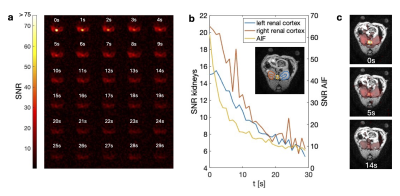 |
Computer Number: 62
4488. In
vivo imaging of 15N-Betaine: A long-lived, endogenous molecular
contrast agent for hyperpolarized MRI
I. Skre, M. Karlsson, R. Olin, M. Lerche
Technical University of Denmark (DTU), Kongens Lyngby, Denmark
Impact: We introduce 15N-Betaine,
a long-lived endogenous molecular contrast agent for
hyperpolarized MRI, demonstrating feasibility for in
vivo imaging. Its extended signal-lifetime supports
prolonged acquisitions and enables flexible protocols with
adaptable timing and resolution, offering a new tool for
molecular imaging.
|
|
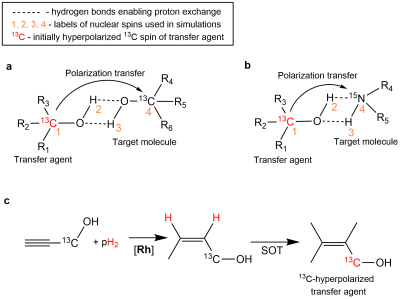 |
Computer Number: 63
4489. Increasing
15N and 13C polarization in parahydrogen-induced polarization
relayed via proton exchange.
K. Them, J. Kuhn, A. Pravdivstev, J-B Hövener
University Medical Center Schleswig-Holstein , Kiel, Germany
Impact: The findings pave the way to develop a pH2-based
method that can strongly polarize 13C and 15N nuclei of a
wide range of biomolecules playing an important role in
metabolic MR imaging. Scientists may try to use new imaging
agents.
|
|
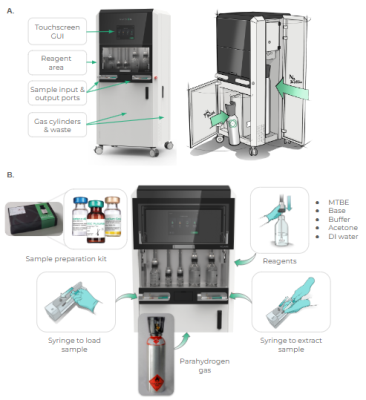 |
Computer Number: 64
4490. Fast
PHIP-based hyperpolarization of 13C 𝛂-ketoacids using POLARIS:
high polarization, reproducibility, and in vivo results
M. Chaumeil, L. Nagel, Z. Ahmadova, M. Gierse, M. Grashei,
J. Handwerker, F. Josten, S. Karaali, C. Rooney, P. Ruetten,
P. Wolff, I. Schwartz, F. Schilling, S. Knecht
NVision Imaging Technologies, Ulm, Germany
Impact: POLARIS
enables rapid, reproducible and high polarization of 13C-labeled
𝛂-ketoacids with an easy-to-use, highly automated workflow.
This breakthrough enables fast, reproducible results, paving
the way for extensive, consistent studies that will
significantly advance the field of hyperpolarized MRI.
|
The International Society for Magnetic Resonance in Medicine is accredited by the Accreditation Council for Continuing Medical Education to provide continuing medical education for physicians.